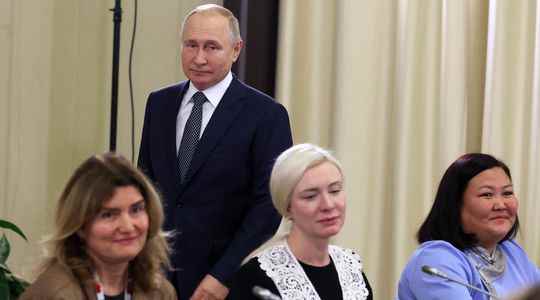It did not take long for Internet users and independent Russian media to identify the “wives and mothers of soldiers” met by Vladimir Putin on Saturday November 25 in his residence in Novo-Ogarevo. Among them, a Moscow official and deputy of the United Russia presidential party; a leader of the pro-Kremlin movement “All-Russian People’s Front”; or a director of “Orthodox and patriotic” films. In other words, a handpicked audience to see the Russian leader, whose “meetings with the population” are carefully choreographed and staged with a lot of extras.
We are a long way from these mothers and wives of soldiers who, for several weeks, have been calling on the authorities on video to ask for news of their relatives sent to the front, complaining about the conditions in which they live and fight, denouncing equipment that is out of order. age and absent or incompetent officers. “Vladimir Vladimirovich, are you a man or what?” Called Olga Tsukanova, president of the “Council of Wives and Mothers” on Tuesday in a video shot to demand a meeting with the Russian president. The call was shocking: if it is common to see the relatives of Russian soldiers denouncing the local authorities, attacking Putin directly is a rare rhetorical escalation. The famous “soldiers’ mothers’ committees”, so active during the wars in Chechnya and Afghanistan to protect young conscripts sent to the front, would they be back?
Heterogeneous movement
The situation is more contrasted. Moreover, the formidable Olga Tsukhanova and her movement did not come from these historical organizations. His “Council of Wives and Mothers” is a recent offshoot of another organization, the “People’s Union for the Renaissance of Russia”, a conspiratorial nebula denouncing, with anti-Semitic accents, a world plot of “genocide of the people Russian”, organized with the complicity of its rulers, and whose previous feat of arms had been a virulent opposition to compulsory vaccination against Covid. The “real” committees, such as the historic one headed by Valentina Melnikova, are marginalized, sidelined by the aging of their leaders and by the evolution of forms of activism in Russia. Organizations of mothers and wives of soldiers still exist today… But it is a myriad of informal groups, organized spontaneously on Telegram messaging. And there is no question of risking a political questioning or a criticism of the invasion of Ukraine.
Because what was possible in the 1990s is no longer possible today. Criticizing the “special military operation” is punishable by heavy fines and jail time. Above all, decades of propaganda have done their job. “It is not a questioning of the fairness of the war that we see rising, notes sociologist Anna Colin-Lebedev, but a hatred of the Ukrainian. These women have been impregnated by eight years of propaganda, which have created this image of the fascist Ukrainian. When they lose their loved ones, it’s the Ukrainians they accuse of being murderers.”
Local authorities in the crosshairs
In this context, criticism of the Russian authorities is limited to denouncing the shortcomings of their equipment and their preparation. “We are not against Russia, almost systematically specify the authors of videos challenging the authorities. Give our sons, our husbands, enough to fight normally.” And the accusations of incompetence or corruption focus mainly on local authorities, civil servants and governors, on the front line in organizing the mobilization.
These calls are not in vain: some, which have gone viral, force the authorities to react, to withdraw from the front such a unit abandoned by its officers, to re-equip another which has only touched rusty Kalashnikovs… But without mobilization as a whole is not called into question. “The committees of soldiers’ mothers in the 1990s did not stop the two wars in Chechnya,” Anna Colin-Lebedev recalls. do not think that this new mobilization will be able to stop the war in Ukraine.”
